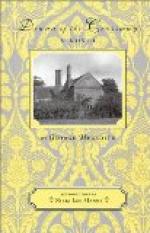‘I suppose the young Minister is Mr. Percy Dacier?’ said Emma.
‘Between ourselves he is,’ Diana replied, smiling at a secret guessed. ‘You know my model and can judge of the likeness.’
‘You write admiringly of him, Tony.’
’And I do admire him. So would you, Emmy, if you knew him as well as I do now. He pairs with Mr. Redworth; he also is the friend of women. But he lifts us to rather a higher level of intellectual friendship. When the ice has melted—and it is thick at first—he pours forth all his ideas without reserve; and they are deep and noble. Ever since Lord Dannisburgh’s death and our sitting together, we have been warm friends —intimate, I would say, if it could be said of one so self-contained. In that respect, no young man was ever comparable with him. And I am encouraged to flatter myself that he unbends to me more than to others.’
‘He is engaged, or partly, I hear; why does he not marry?’
‘I wish he would!’ Diana said, with a most brilliant candour of aspect.
Emma read in it, that it would complete her happiness, possibly by fortifying her sense of security; and that seemed right. Her own meditations, illumined by the beautiful face in her presence, referred to the security of Mr. Dacier.
‘So, then, life is going smoothly,’ said Emma.
’Yes, at a good pace and smoothly: not a torrent—Thames-like, “without o’erflowing full.” It is not Lugano and the Salvatore. Perhaps it is better: as action is better than musing.’
‘No troubles whatever?’
’None. Well, except an “adorer” at times. I have to take him as my portion. An impassioned Caledonian has a little bothered me. I met him at Lady Pennon’s, and have been meeting him, as soon as I put foot out of my house, ever since. If I could impress and impound him to marry Mary Paynham, I should be glad. By the way, I have consented to let her try at a portrait of me. No, I have no troubles. I have friends, the choicest of the nation; I have health, a field for labour, fairish success with it; a mind alive, such as it is. I feel like that midsummer morning of our last drive out together, the sun high, clearish, clouded enough to be cool. And still I envy Emmy on her sofa, mastering Latin, biting at Greek. What a wise recommendation that was of Mr. Redworth’s! He works well in the House. He spoke excellently the other night.’
‘He runs over to Ireland this Easter.’
’He sees for himself, and speaks with authority. He sees and feels. Englishmen mean well, but they require an extremity of misery to waken their feelings.’
‘It is coming, he says; and absit omen!’
’Mr. Dacier says he is the one Englishman who may always be sure of an Irish hearing; and he does not cajole them, you know. But the English defect is really not want of feeling so much as want of foresight. They will not look ahead. A famine ceasing, a rebellion crushed, they jog on as before, with their Dobbin trot and blinker confidence in “Saxon energy.” They should study the Irish: I think it was Mr. Redworth who compared the governing of the Irish to the management of a horse: the rider should not grow restive when the steed begins to kick: calmer; firm, calm, persuasive.’




